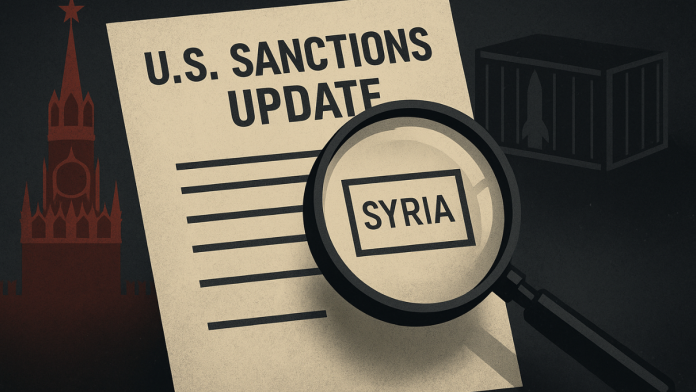A recent update from the U.S. Treasury has sparked confusion online, leading to claims that sanctions were accidentally lifted from Rosoboronexport, Russia’s state-run arms exporter. The story quickly spread across social media and news platforms, with headlines suggesting that the Trump administration may have unknowingly delisted a major Russian military entity while making changes to Syria-related sanctions.
But did this actually happen? A closer look reveals a different reality — one that separates fact from rumor and highlights how small technical updates can cause big misunderstandings.
Confusion Over Syria Sanctions Sparks Misreporting
The confusion started when the U.S. Treasury Department’s Office of Foreign Assets Control (OFAC) released new updates regarding Syria-related sanctions. A few Russian names were indeed taken off the Specially Designated Nationals and Blocked Persons List (SDN List), which tracks individuals and companies under economic sanctions. But the real question is whether Rosoboronexport was among them. And the answer is no.
Several media outlets reported that the sanctions on Rosoboronexport were removed altogether. However, a thorough review of OFAC’s update shows that Rosoboronexport was not removed from the sanctions list. Instead, only one of the many tags used to identify the basis of its sanction—specifically, the [SYRIA] tag—was taken off. The company still remains under multiple other U.S. sanctions, including those linked to Russia’s actions in Ukraine, arms dealings with Iran, and broader sanctions under Executive Order 14024.
💰 Cartel crackdown collides with Wall Street—Mexican banks purge clients to dodge U.S. sanctions
What Really Changed in the Sanctions List?
To better understand this situation, it helps to know how U.S. sanctions work. Each individual or business on the OFAC list is tagged with the specific executive order that led to their sanction. These tags help identify which U.S. laws or orders are being used to block them.
In this case, Kirsan Ilyumzhinov, a Russian businessman and former head of the World Chess Federation, along with several companies linked to him, were removed from the list. They had previously been sanctioned for their support of the Syrian regime. These removals appear to be part of a routine review of entities no longer considered relevant or active.
Some of the companies that were also delisted include:
- Russian Financial Alliance Bank, whose license was revoked in 2016,
- Tempbank, another bank whose license was pulled in 2017,
- and other institutions presumed to have assisted the Syrian regime.
However, Rosoboronexport was not one of those removed. The company remains under strict U.S. sanctions. The only change was the removal of the [SYRIA] designation from its profile. This [SYRIA] tag refers to older executive orders tied to Syria-related actions, including Executive Orders 13338, 13399, 13460, 13572, 13573, and 13582.
Despite that change, Rosoboronexport still carries the following designations:
- [UKRAINE-EO13662] – related to Russia’s activities in Ukraine, especially the annexation of Crimea.
- [IRAN-CON-ARMS-EO] – connected to restrictions involving arms transactions with Iran.
- [RUSSIA-EO14024] – broad sanctions against Russian activities signed under President Joe Biden.
So, while the company’s Syria-related tag was taken off, it still remains heavily sanctioned by the United States.
🚨 Global overreach? Microsoft accused of enforcing EU sanctions on Indian soil
Misreporting Leads to Social Media Chaos
The initial confusion led to incorrect reporting, including a now-retracted post by a Ukrainian news outlet that cited The Moscow Times. The report claimed that Rosoboronexport had been delisted entirely. However, The Moscow Times did not state that the company was removed from sanctions. It only noted that Rosoboronexport appeared in the updated OFAC list due to its past links with Syria.
The publication clarified that several other companies were also mentioned in the update, such as:
- Promsyriemport
- RFK-Bank
- Global Concepts Group
- Global Vision Group
- STG Logistic
- Maritime Assistance
- and Mir Business Bank, an Iranian financial entity.
Later clarification confirmed that only specific names were actually removed—mainly those inactive or previously tied to now-defunct Syrian regime connections. The U.S. Treasury Department’s records clearly show that Rosoboronexport remains sanctioned and is still restricted from doing business with U.S. entities or accessing the U.S. financial system.
This incident highlights how small technical updates in complex sanction lists can be misunderstood. Even changes as minor as removing a single tag can lead to widespread misinformation if not reported accurately.
